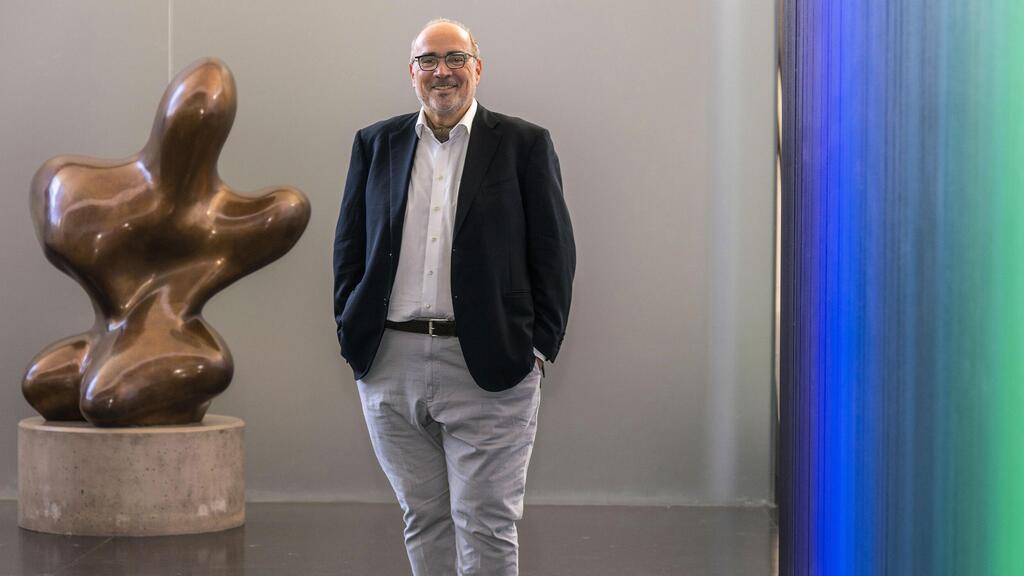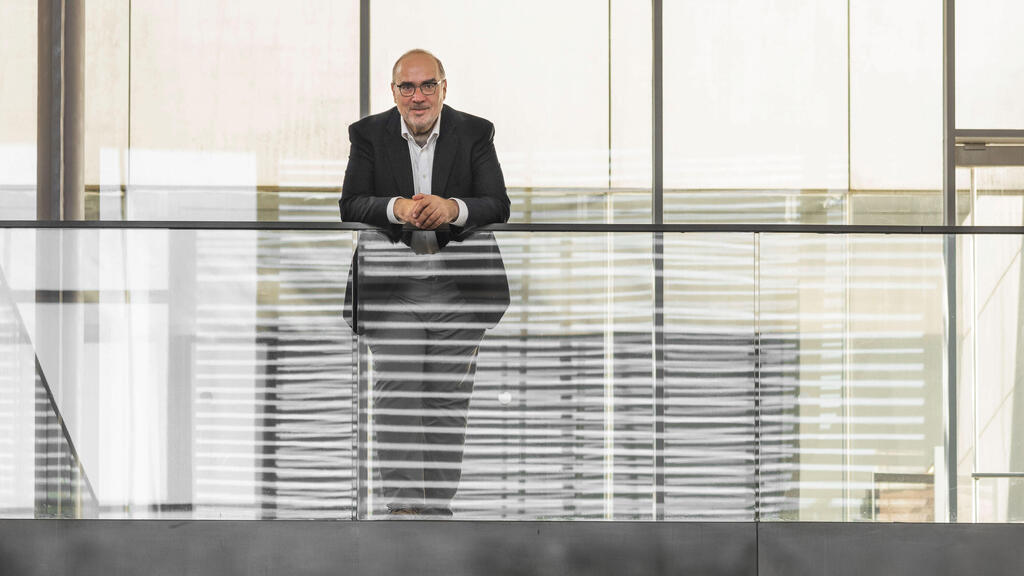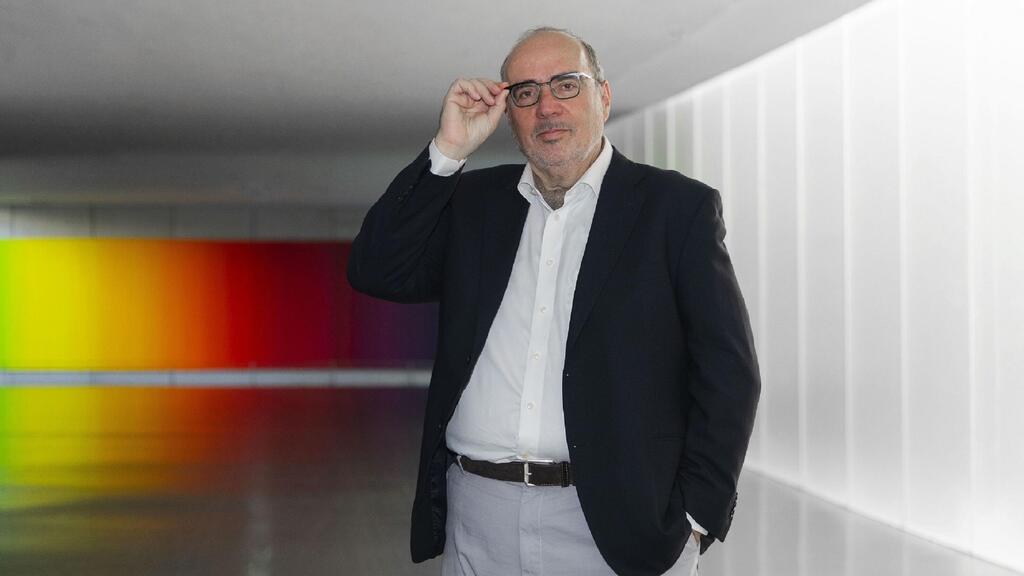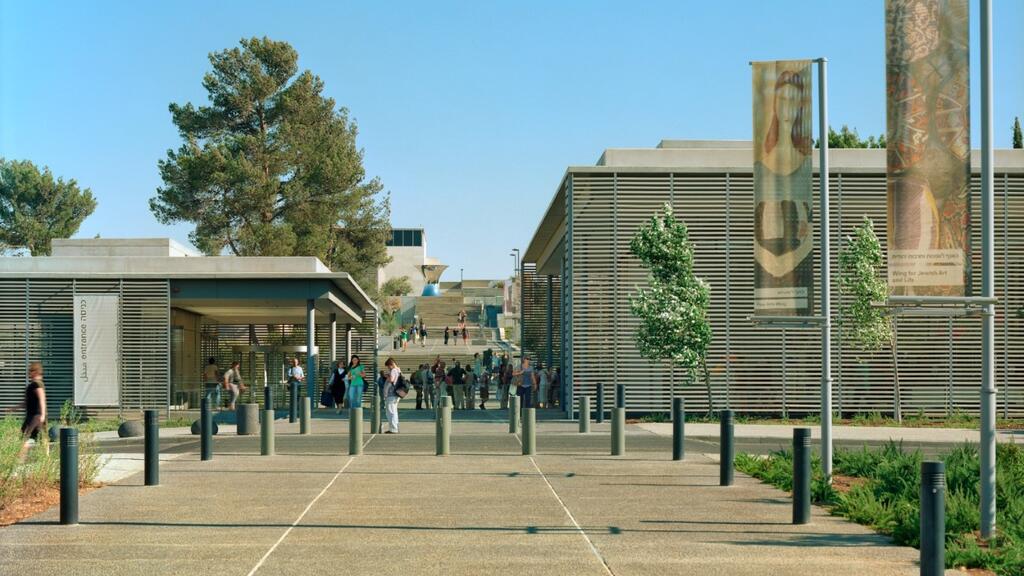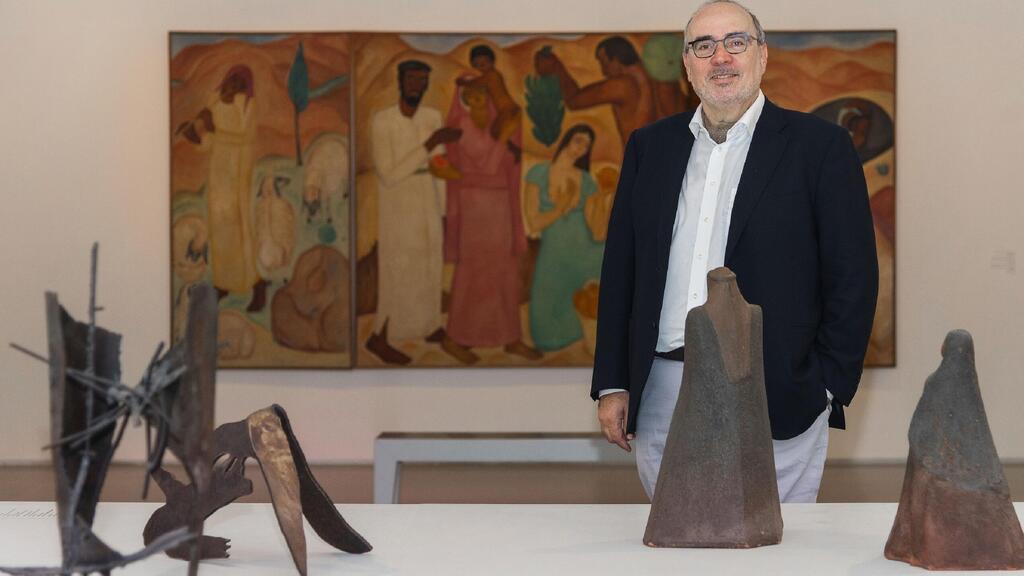Getting your Trinity Audio player ready...
The past few years have been the most challenging years the Israel Museum in Jerusalem has experienced. The COVID-19 lockdowns have affected the number of visitors and revenues, and have impacted the ability to continue showcasing art and exhibitions.
Read More:
Former Director of the Israel Museum Prof. Ido Bruno faced a tough role during this time - dozens of employees left, positions remained vacant, and a major employee dispute broke out due to a violation of the cooperation agreement signed by the management and the staff.
Bruno's successor, Prof. Denis Weil, was left to cope with this convoluted endowment. Up until now, he has refused to give interviews, out of a desire to purely experience the role first and understand his goals and objectives. Now, he is speaking out for the first time - a year and a half after assuming his position.
Weil (62) was born to a Jewish family from Switzerland, which has been a prominent donor to the museum over the years. He never lived in Israel, aside from one semester when he studied at Bezalel Academy of Arts and Design, but he feels a strong connection to the country. He was asked to submit his candidacy for the director's job in 2016 but made no clear offer.
He used to visit Israel twice a year, his parents had a home here, and his two sisters, brother, and nine nieces and nephews have already made Aliyah. Now, it's his turn to make Aliyah, thanks to his new position in the esteemed cultural institution, which he remembers visiting for the first time as a child in elementary school.
"My parents were very involved in these museums, so I came to this museum for the first time when I was 10 years old. It was incredible. I still have the views in my head," Weil recalled.
When did you realize that you also wanted to work in this field?
Weil explained that his love of art came from home, and already at a very young age, he started investing his time and energy into collecting art.
"I worked at the airport on Sundays. That was a way to make some extra money. But the way I used the money is to actually buy my first piece of art when I was 18. And then it was the second one, so I always liked it, and I like politically conceptual art as well because it makes you think so that's how it came through."
As a matter of fact, Weil could have received the prestigious title of "Director of the Israel Museum" as early as 2016. By then, he already had an impressive track record that included serving as the vice president for innovation and design at McDonald's. However, he chose not to apply for the position at the museum just yet.
"This is my last full-time gig," he said. "I changed careers every six years, and I call myself a 'millennial in a boomer's body' because this generation switches jobs frequently. I was asked in 2016 and just told them I'm not qualified.
"But then I shifted into academia and became the dean of the Institute of Design [at Illinois Tech]. University museums are modeled after the universities, the faculty and curators really are their content entrepreneurs," Weil explained that the role of directing a museum is actually very similar to a management role in hi-tech, as both strive to provide the best conditions and content possible.
How did your previous work, such as your job at McDonald's, contribute to this role?
Weil articulated that he thinks a museum is the "perfect combination" of an academic institution and an organization like McDonald's.
"We have 900,000 visitors a year, we have to welcome them, we have to be sure that they get a good experience. It is very different than university because in the university you have a captive audience - the students stay four years or two years," Weil said. "As weird as it must sound, I think that my combination of experience in running the graduate school and academia, and running a retail service business is actually perfect."
He wasn't eager to open up about his previous role at McDonald's. Nevertheless, he understands why he was recruited for the position at the Israel Museum. One of the reasons Weil got the job, according to him, was his experience in helping organizations find "the next life cycle.
"Large organizations like this museum, like McDonald's, like Bloomberg Philanthropies have, from my experience, 20-year life cycles, so every 20 years they lose relevance. They have a tendency of doing that because they are too internally focused, but they're not looking enough at what's happening outside," he noted.
"The museum is actually approaching 60 years, so I think we're just ending our third life cycle and we have to find the next one. That's what I've done at McDonald's, modernized it. So I think that's natural."
Weil elaborated on Israel Museum's life cycles, and claimed that the first was "all about building connections."
"We need to think about the peak pressure on museums in the world now," he added, explaining that the emphasis needs to be on understanding that art objects belong to the public, and museums are merely the guardians. Hence, items are lent to museums in Israel and worldwide, and their role is to get things to the periphery.
The second life cycle of the Israel Museum "was about professionalism" and bringing art studies to Israel. Weil said that while the Israel Museum is a place that generates a "talent pool," many people take their talent elsewhere, and we need to focus on convincing them to stay.
The last life cycle, which took place during the last 20 years, focused on transitioning "from a regional museum to an international museum." However, he argues this was done with an emphasis on "contemporary art," and that the focus for the next 20 years should be incorporating history and "using culture to strengthen society and communities. "
A destination museum
Although Weil understands Hebrew quite well and is determined to conduct some of the conversations with museum employees in Hebrew, the interview was conducted in English.
"All museums around the world have seen a significant decline in school classes coming," he explained. "Right now the way it works in Jerusalem is that the school gets money from the municipality, but they can choose where they take them," whether it be a museum or any other cultural or educational institution.
Nevertheless, Weil said that the age gap in museums is between 14, to 32, and at 14 "they're not engaged, they don't follow their parents. And then they come back when they have children."
He added that today, "the two cultural institutions that are a little bit behind and struggling a little bit with digital transformation and its theaters and museums."
One of the problems museums are trying to tackle are guided digital tours. "Under COVID, they started with 40-minute tours of the museum. Now nobody watches a 40-minute tour anymore because people are outside of the house again. So we have now gone down to two minutes and 59 seconds.
Just last summer we had all of them get 500,000 viewers within three months. So this is obviously an incredible way of reaching users. And today I look at it as kind of the Netflix strategy - So I look at the digitals, if they see 300 videos, it's kind of episode one, and once you see episode one, you're going to be hooked so then you'll come to the museum. So those are the ways that we want to go and this is again this idea of programming versus exhibition."
When Weil talks about the projects they are working on at the museum to attract a young audience, his eyes light up. He provides many details about projects happening in London and Paris, and he has come prepared.
Aside from children, the goal is to attract more people from the Arab and ultra-Orthodox populations. Thus, the program "Shared Mosaic for Jewish and Arab Students in Lod" was born, aiming to create a connection between the students through a creative project.
Another interesting project he has invested in is called "Object, Society, and Identity," designed to empower Arab-speaking girls, mostly from East Jerusalem, and includes tours of museum exhibitions focusing on objects that express personal or social identity.
"We just started working with an agency that will help us promote the museum on social networks to reach the Arab society because we are not reaching them enough. We also started a program with an ultra-Orthodox organization to bring more Haredi visitors here. Compared to the zoo or the aquarium, we are lagging behind in terms of connection with these populations, and we need to work on it. I'm trying to understand how to lower the barriers of the museum.
When people go to the Tel Aviv Museum, many times it's for an 'impulsive visit' in the morning, when they have an hour's break. But we are a destination museum; people need to decide to come here four days in advance, but then there's rain - and they don't come, and then there's a terror attack - and they don't come."
Can you understand people's fear of coming to Jerusalem?
"Yes and no. Fear is always irrational and I think that's what's happening. And yes, people in Israel are overly sensitive to fear because of the situation. But I'm not sure that that it's helpful to making progress in the conflict. I don't think it's helpful that people in Tel Aviv do not want to come to Jerusalem because they don't want to be confronted with the conflict. Because that is avoidance of actually trying to do something.
There's not going to be a solution from heaven. These are messy, messy, messy things that I think are slowly evolving through facing them. And that's where art comes in. I mean, art is talking about artist politics."
Despite being a new immigrant, Weil is very caught up on the political situation in the country, and he even testifies that he participates in demonstrations every Saturday in Jerusalem.
During the fifth or sixth week of the demonstrations, Weil recalls a day when the demonstrators went to the Knesset. The protest was at 2:00pm, and it was amazing to see that on the same day at 10am, crowds arrived at the museum.
"All the snacks at the cafeteria were sold out in the early opening hours. Everyone brought flags, and we had to arrange a designated area where people could store them. It was wonderful to see people combining culture with their political outlook.
In the next protest, before Passover, we decided to open the garden for a week for free so that people could absorb some harmony, replenish their energy, or meditate. We felt that our role was to help people think and strengthen themselves through culture. The museum has accompanied the country for 58 out of the 75 years it has existed, and I think we fulfilled that role from the beginning – to promote culture as a material that fills modern society and transforms it."
What is your opinion about government ministers not seeing the importance of the public visiting museums on Shabbat?
"From a museum manager's perspective, the Israel Museum has never been part of the initiative and has never received that funding, so it does not affect us.
Personally, it is clear that I have opinions about things happening here. But it is clear that we are pro-culture, pro-freedom of expression, and pro-programs intended for the entire population and visitors, so I think it explains where I stand.
Beyond that, I grew up in a religious home, and I appreciate religion, so I don't think it's black and white. The question is how to integrate all communities so that each one will have a place of respect."
About a year ago, the municipality of Jerusalem asked a gallery in the city to remove nude art – is that something that could happen during your tenure? Are you afraid of censorship?
"To my delight, we are blessed to be a society for the benefit of the public, so we are an independent organization where the state is one of seven members of this corporation – so we are not in danger of censorship. Unless the government decides to pass a national law prohibiting us from showing such and such a thing. But in principle, we have full artistic freedom, and the board of directors is not involved in any decision, and we take it very seriously.
However, similar to what is common in major museums around the world, we usually provide advance notice when there is something that could be triggering. For example, we have a room that has a sign at its entrance indicating nudity, or a room that contains content that may be provocative. But we would never remove any artwork."
As mentioned, Weil's family has a close connection to the museum; his mother established its Swiss Friends Association in the 1990s, his sister worked there in the 1980s, and his brother Philip was the chairman of the Israeli Friends Association of the museum until he took office. However, he is not at all keen to hear about the question of whether he got the position because of them.
"My parents died a long time ago, so they had no connection to this appointment. We completed our last donation, in memory of my father, before I took office, so I hope there is no connection - I don't think there is."
What would you say to people who still raise objections?
"Because we receive part of our salary from the state - although we are not a government organization - people who work in the museum are people who work here out of passion. If you want to work somewhere just for a salary, you probably won't choose to work in a museum. The only connection is that it was a passion that my parents had and that they passed on to us. I don't think that's a bad thing - it's just another way to express that passion."
How is the museum different from other museums in the world?
"It's not a traditional museum where you have a grand entrance like a temple that makes you feel small, where you enter and understand that you need to be quiet now. I believe that the Israel Museum is the largest Jewish museum in the world, but in any case, it is the only museum that presents cultures of the Diaspora of the 2000 years."
How is managing a large institution in Israel different from institutions in the world? Is there a feeling that more effort is needed in Israel to achieve things?
"There's negotiations happening in every culture and every country. I think the Israeli way of discussing and negotiating is a little bit more loud and more aggressive but at the end of the day it's still, it's still the same.
Another problem that institutions in Israel face is BDS. Is that something you encounter?
"There are countries where it is more central in their work, for example in Britain or the Nordic countries. But so far, we haven't dealt with significant issues on this matter. We have an exhibition we are currently working on, and there was one artist who refused to participate, but he was already involved in BDS before. Am I okay with BDS? No, it doesn't help us achieve international recognition, but it's a relatively small problem."
A more global topic that currently occupies the art world - and some see it as a problem - is artificial intelligence.
"I think it's still a medium to explore. But it's important to honestly say that it's not new. That's the idea - to take the existing technology and create a new way of looking at things. It opens up new perspectives and horizons."


